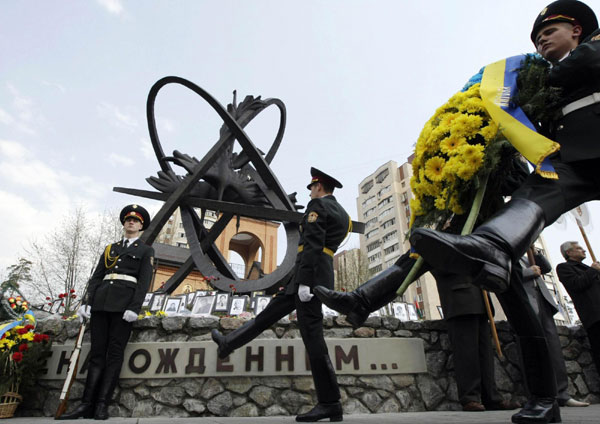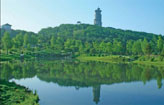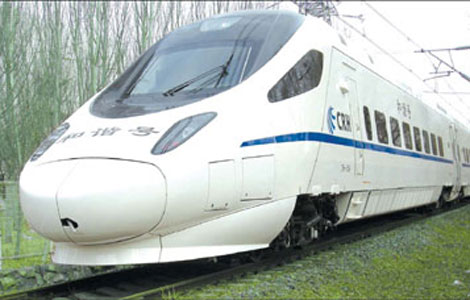Europe
Russia calls for stricter nuclear safety rules
Updated: 2011-04-26 21:50
(Agencies)
 |
|
Ukranian officers march with a wreath during a ceremony to honour the victims of the Chernobyl accident, held in Kiev April 26, 2011. [Photo/Agencies] |
KIEV, Ukraine - Russian President Dmitry Medvedev called on the international community to work out unified guidelines to prevent accidents such as the Chernobyl disaster 25 years ago while continuing to develop nuclear energy.
Medvedev and his Ukrainian counterpart Viktor Yanukovych spoke at a memorial ceremony outside Chernobyl's ravaged 4th nuclear reactor that exploded on April 26, 1986, spewing a cloud of radioactive fallout over much of Europe and forced hundreds of thousands from their homes in the most heavily hit areas in Ukraine, Belarus and western Russia.
"It's of utmost importance that we understand what kind of force humankind is dealing with so that our solutions ... meet the challenges of nuclear energy," Medvedev said. He added that he has invited world leaders to take part in developing a set of rules for safer nuclear energy.
Medvedev and Yanukovych took part in a religious memorial service led by Orthodox Patriarch Kirill near the Chernobyl plant, laid the first stone of a monument to Chernobyl cleanup workers and laid bouquets of red roses at another monument to Chernobyl victims.
"The consequences of the accident have been huge, but if it hadn't been for the work of the 'liquidators', the work of the firefighters, the rescuers and doctors these consequences would have been global. We must remember that," Medvedev said.
Yanukovych stressed that nuclear accidents such as Chernobyl and the nuclear explosion at Japan's Fukushima Dai-ichi nuclear plant affect the whole planet and renewed calls for money to build a new, safer shelter over the damaged reactor. Ukraine must still raise some $300 million to cover up the plant, which remains a no-go zone a quarter century after the disaster.
"The whole world has become convinced that such catastrophes have no boundaries and Fukushima-1 serves as a bitter example of that," Yanukovych said. "No nation can battle such catastrophes alone."
The Chernobyl explosion released about 400 times more radiation than the U.S. atomic bomb dropped over Hiroshima. Hundreds of thousands were sickened and once-pristine forests and farmland still remain contaminated. The U.N.'s World Health Organization said at a conference in Kiev last week that among the 600,000 people most heavily exposed to the radiation, 4,000 more cancer deaths than average are expected to be eventually found.
But besides the physical damage, Chernobyl has left a deep psychological wound in the hearts of many Ukrainians, Russians and Belarusians because of the authoritarian Soviet government's disregard for their safety and lives. Soviet leaders waited for days to inform the people of the accident, instruct them how behave to reduce health risks and evacuate them from contaminated areas.
Medvedev called that a major mistake.
"The duty of the government is to tell its people the truth. One must admit that the government did not always behave in the right way," he said
"We must all be honest, we must give absolutely clear information about what is going on."
Many Chernobyl victims agreed.
Artur Tverdokhlebov, 80, a retired subway worker, joined some 3,000 Chernobyl victims at a memorial service commemorating the accident at a monument in Kiev. "Chernobyl is an open wound in the soul of our people," said Tverdokhlebov, who was rushed to clean up the aftermath of Chernobyl in May 1986.
"The authorities kept secret what had really happened, nobody told us anything about the danger and we ate the fish that we caught in the river," he said.
Earlier Tuesday in Kiev, Patriarch Kirill led a memorial ceremony outside a monument to workers and firefighters who were sent to the station immediately after one of the reactors exploded and who died shortly after from acute radiation poisoning.
Black-clad Orthodox priests sang solemn hymns, Ukrainians lit thin wax candles and a bell tolled 25 times for the years that have passed since the disaster.
Russia, Ukraine and Belarus have cut the benefits packages for sickened cleanup workers in recent years and the memorial events were overshadowed by their complaints for more aid. Prime Minister Mykola Azarov vowed Tuesday that benefits to Chernobyl victims would continue to be paid.
Belarusian President Alexander Lukashenko, blacklisted by the European Union after a violent crackdown on opposition activists late last year, did not take part in memorial events in Ukraine. His office said Lukashenko had no plans to come to Ukraine as he will be paying his respects to Chernobyl victims in Belarusian villages contaminated by the disaster. Some observers believe Ukraine is marking the Chernobyl anniversary without Lukashenko to please Brussels as it seeks EU membership.
Specials

Models gear up car sales
Beauty helps steer buyers as market accelerates.

Urban breathing space
City park at heart of industrial hub positions itself as top tourism attraction

On a roll
Auto hub Changchun also sets its sight on taking lead in railway sector